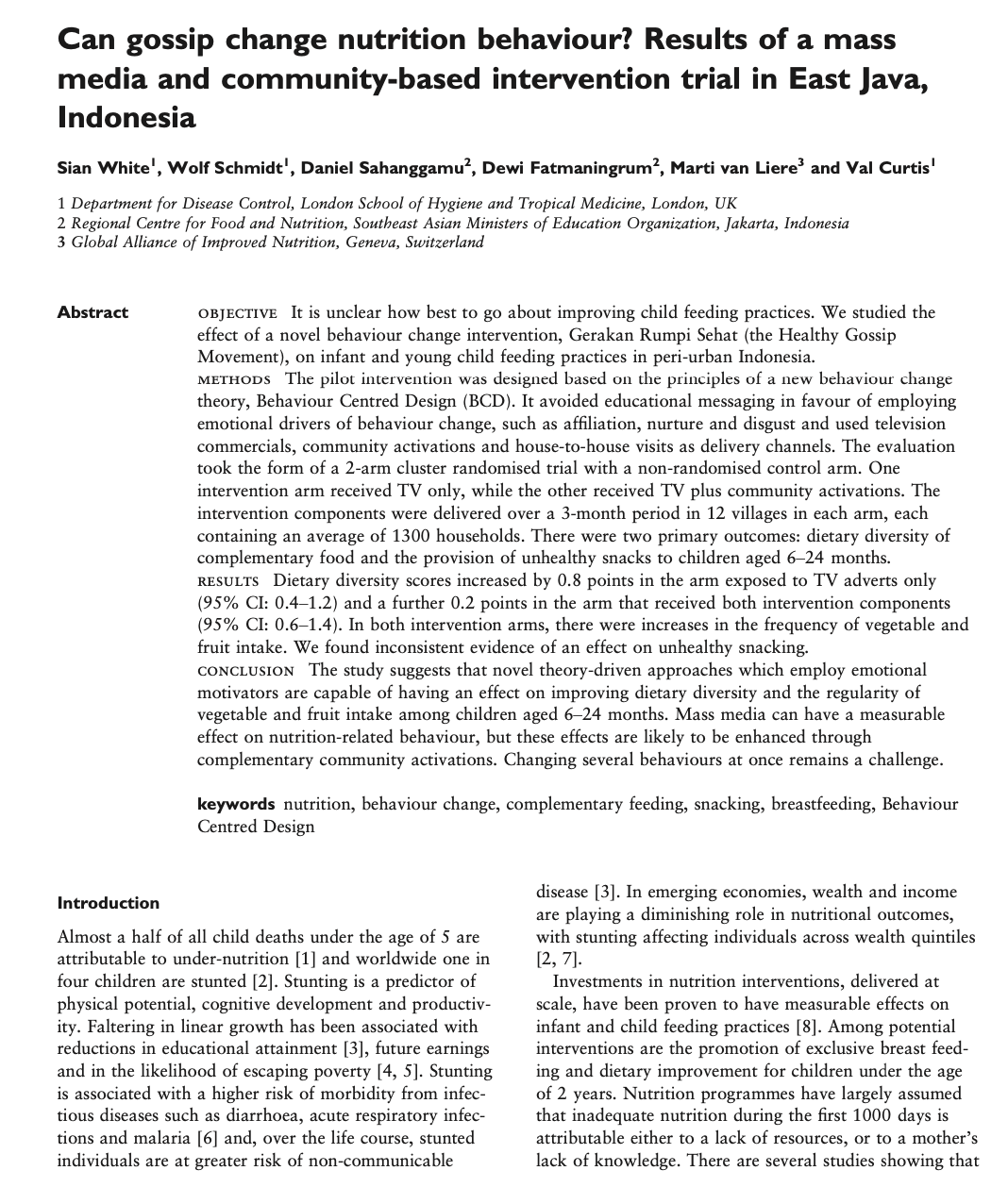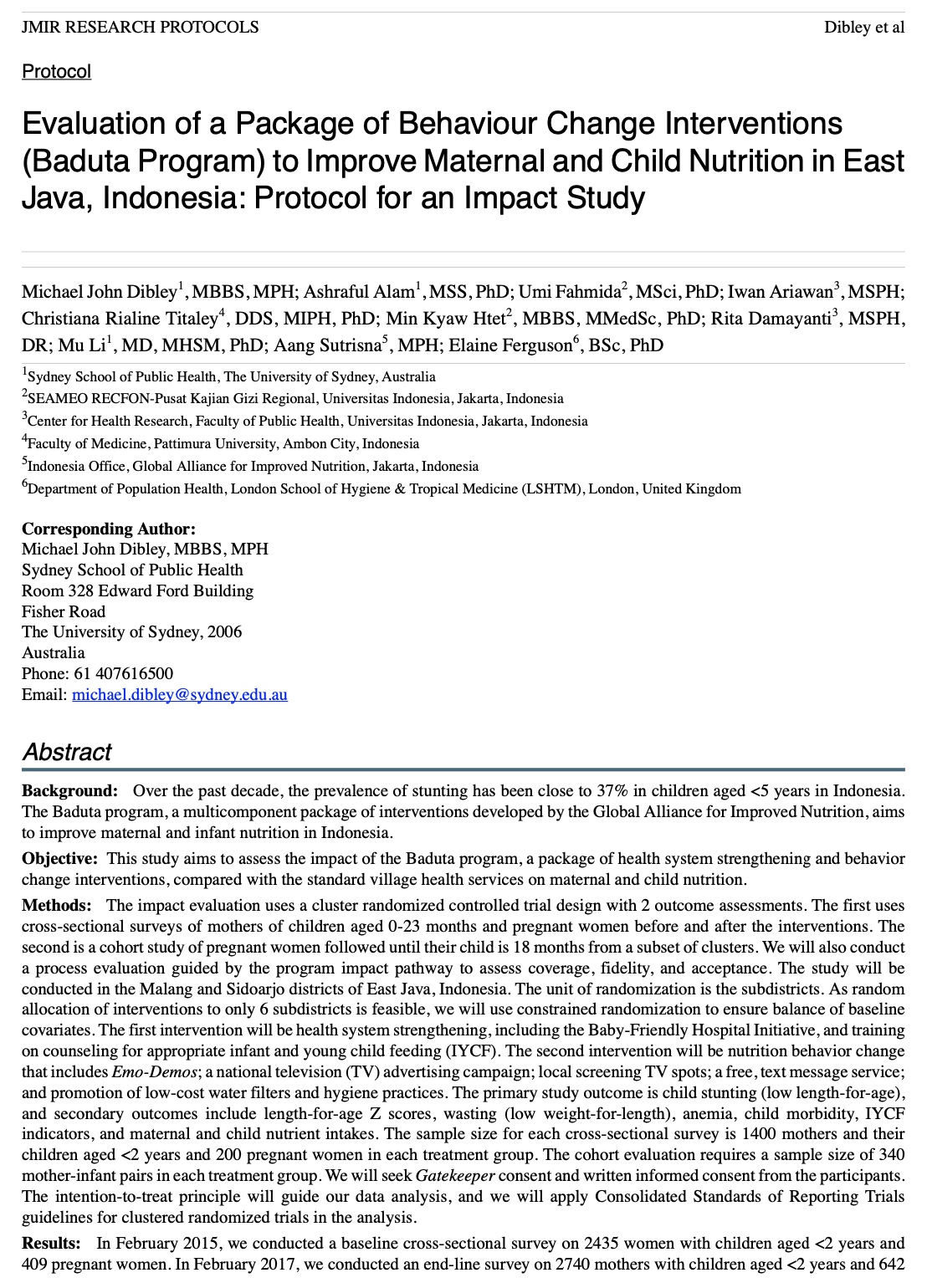
Improving childhood nutrition in Indonesia through an innovative behavioural change programme
The programme targets four behaviours: exclusive breastfeeding, complementary feeding, eating healthy snacks and encouraging nutrient-rich diets for expectant mothers. It uses emotional demonstrations or ‘emo-demos’ and is complemented with health system strengthening activities, including the revival of the Baby Friendly Hospital Initiative, a global effort launched in 1991 by WHO and UNICEF to implement practices that protect, promote and support breastfeeding in maternity facilities

Evaluation of a Package of Behaviour Change Interventions (Baduta Program) to Improve Maternal and Child Nutrition in East Java, Indonesia: Protocol for an Impact Study
Background: Over the past decade, the prevalence of stunting has been close to 37% in children aged <5 years in Indonesia. The Baduta program, a multicomponent package of interventions developed by the Global Alliance for Improved Nutrition (GAIN), aims to improve maternal and infant nutrition in Indonesia. Objective: This study aims to assess the impact of the Baduta program, a package of health system strengthening and behavior change interventions, compared with the standard village health services on maternal and child nutrition.

Effect of an Integrated Package of Nutrition Behavior Change Interventions on Infant and Young Child Feeding Practices and Child Growth from Birth to 18 Months: Cohort Evaluation of the Baduta Cluster Randomized Controlled Trial in East Java, Indonesia
The need for a multisectoral approach to tackle stunting has gained attention in recent years. Baduta project aims to address undernutrition among children during their first 1000 days of life using integrated nutrition-specific and nutrition-sensitive interventions. We undertook this cohort study to evaluate the Baduta project’s effectiveness on growth among children under 2 years of age in two districts (Sidoarjo and Malang Districts) in East Java. Six subdistricts were randomly selected, in which three were from the intervention areas, and three were from the control areas. We recruited 340 pregnant women per treatment group during the third trimester of pregnancy and followed up until 18 months postpartum.

Determinants of low breastfeeding self-efficacy amongst mothers of children aged less than six months: results from the BADUTA study in East Java, Indonesia
Despite the increasing rate of exclusive breastfeeding in Indonesia, there is still a need for supportive interventions. The breastfeeding self-efficacy of mothers is a key factor positively associated with optimum breastfeeding practices. Our analysis aims to assess the determinants of low breastfeeding self-efficacy amongst a sample of women with children aged under 6 months in Malang and Sidoarjo Districts, East Java, Indonesia.

Can gossip change nutrition behaviour? Results of a mass media and community-based intervention trial in East Java, Indonesia
The study results showed an increase in the frequency of vegetable and fruit intake in both groups. However, the BCD-based new approach affected the diversity of food consumed and regularity of vegetable and fruit consumption among children aged 6-24 months.

Evaluation of a Package of Behaviour Change Interventions (Baduta Program) to Improve Maternal and Child Nutrition in East Java, Indonesia: Protocol for an Impact Study
The study was done by Dibley et al. aimed to assess the impact of the Baduta programme as a package of health system strengthening and behaviour change interventions. The evaluation was done in Malang and Sidoarjo districts in East Java. The researcher conducted an impact evaluation using a cluster randomised controlled trial design with 2 outcome assessments. The first used cross-sectional surveys of mothers of children aged 0-23 months and pregnant women pre and post interventions. The second outcome was a cohort study of pregnant women followed until their child is 18 months from a subset of clusters.